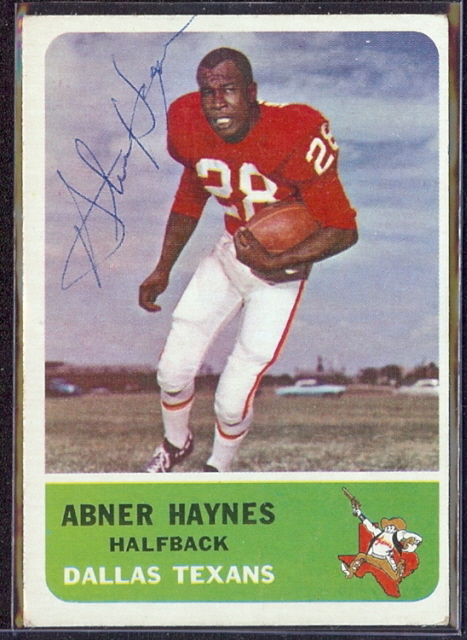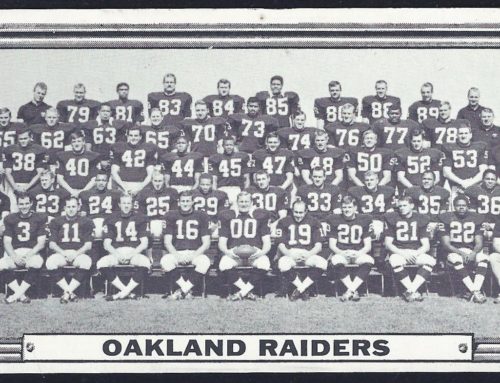Last month AFL author, Dave Steidel, sent me a couple of new stories that he had written for Tales. Here is the first, a look back at Abner Haynes’s flub (or not flub?) in the 1962 AFL Championship Game. ~Todd Tobias
Dear Abner, The Ref Goofed! by Dave Steidel
Left or right, vanilla or chocolate, drive or walk, small or large? Decisions, decisions, decisions! Something that we are faced with on a daily basis. But as we all know, they are not always black or white. Instead of left or right, sometimes we can go straight. Vanilla or chocolate? Ever hear of a ‘black cow’? Drive or walk, how about peddling! Small or large? What about medium? Forced choices are part of narrow band of decisions that gives us only limited options and at times we have to bite the bullet, so to speak, and choose either one or the other base on the information we have available to us at the time. And you will see in this article, in pro-football, at least in AFL in 1962, the choices when winning a coin toss ARE NOT simply to kick or receive!
For more than fifty years Dallas Texan captain Abner Haynes has been questioned, maligned and criticized for his infamous decision to “kick to the clock” after his “heads” call at the coin toss leading into the 1962 AFL Championship game’s overtime period with the Houston Oilers and Texans tied at 17-17. It was only the second time in pro-football history that a fifth period was needed to crown a winner. The game eventually become the longest game in pro-football history at the time, extending into a sixth period.
Yet for all the time that has passed through all of the documentation with NFL Films, Full Color Football videos and historical chronicles about the American Football League I have never heard anyone question the official’s erroneous instructions given to Abner Haynes upon winning the overtime toss.
You would assume that the official in charge would have full knowledge of the rules and the choices that go along with winning a coin toss. And as such, Haynes and his Dallas co-captain E.J. Holub put their faith in the professionalism and preparation of those in charge. Was it for the players to know if the coin toss rules changed for the overtime period from those that governed the pre-game coin toss? Would the choices for the winner be the same as well? Since it was only the second time it ever happened, it is possible that there may have been some confusion on everyone’s part, but what player would have known how an overtime period coin toss would work? That was the official’s job.
For the record, the rules for the overtime toss are the same as they are for the pre-game event. As per the 1962 AFL RULE 4, Section 2, Article 1. Item 1: The referee in the presence of both captains, shall toss a coin at center of field. The call shall be made by the visiting captain or by captain designated by the referee if there is no home team. The winner of the toss must choose one of two options and the loser is given the other. The options are: (1) which team shall kick-off or; (2) the goal his team will defend.
But those were not the options Haynes was given after his “heads” call won Dallas the choice. After viewing and listening to the toss over-and-over again, here is how the conversation at mid-field went:
Official to Haynes: “You call it when the coin’s in the air – and call it loudly now – Your call”
Haynes: “Heads”
Official – “Heads” (as the coin fell to the ground)
Official – “Dallas won the call – (as he picked the coin off the ground and now looking at Haynes said) “you have your choice now of course, receiving or kicking”!
But according to the rule, this was not the correct set of options Haynes should have been given. The official erred in his instructions to Haynes. Receiving is not an option according to the rule. The official in charge should have offered: “Do you want to kick or defend a goal?”
So, faced with only the two options – RECEIVE or KICK (wrongly) given to him and knowing that coach Stram had instructed him that if they won the toss, that they did not want to receive but instead would take the clock because of the fierce wind blowing from behind it, Haynes replied: “We will kick to the clock”.
Making sure of the call, the official echoed Haynes’ choice: “You’re going to kick… to the clock”
But here the official erred again. According to rule, Haynes could not make the choice to both kick and defend a goal. Once he said “we will kick” that was the only decision allowed to him. “To the clock” was no longer his option. By rule, second option is given to the loser of the toss.
The official then turned the two sets of captains to face the direction they would attack and also motioned that Dallas would be kicking off. Many reports say that the Oilers told the official that they would defend with their backs to the clock, but that too is erroneous. It never happened. In fact, the official never acknowledged or even spoke to the Oilers before he moved the players to show the direction the kickoff would come from.
As Holub ran quickly to the Dallas sideline to report what happened, Haynes followed. Confusion at this point abounded and to his credit, Stram rolled with the punch, telling Haynes to forget about it, knowing that he needed his star player to have a clear head, put the mistake behind him and focus on the bigger prize.
As we all know, neither team was able to score in the first overtime period, giving Dallas and kicker Tommy Brooker the advantage in the second overtime period with the wind now at their back. And they did not waste it. Dallas went on to kick a game winning field goal in the sixth period to win the first of their three AFL Championship on December 23, 1962, 20-17 and vindicate Haynes for making the forced choice decision he was given the wrong information for.
The coin toss ceremony of the 1962 Championship game has gone down in history as an unfortunate part of the AFL’s lore. But under the circumstances described above, Abner Haynes should not be blamed for a decision he was steered wrongly toward. It was not his fault. Instead he should be remembered for what he was on the field on what he is off of it; an incredibly gifted offensive player, the league’s first rushing champion, rookie-of-the-year and player-of-the-year, an all-star, a league champion and civil rights leader. He has gone on to become more than a champion athlete, he is a champion in life!



I’ve been a Referee at the high school and college level for 28 years and for about 18 of those years the options to the coin toss winner were: “Kick, receive or defend a goal?” The same options were given to the loser of the toss at halftime for the second half kickoff. About 10 years ago, a fourth option (Defer) was added. Now its “Kick, receive, defend a goal, or defer your option to the second half?” The way the AFL referees were “supposed” to present the options is ridiculous to say the least.
Great article!!
Not your fault Abner, ref phrased it like he was Professor Irwin Corey.
Abner Haynes was one of the first AFL players I read about when I was a kid in the late ’70’s. I’ve always known him to be a great player.
I never knew about the coin-toss incident until reading Jeff Miller’s book on the AFL, “Going Long” (2003).
… [Trackback]
[…] Read More to that Topic: talesfromtheamericanfootballleague.com/dear-abner-the-ref-goofed/ […]
… [Trackback]
[…] Find More on to that Topic: talesfromtheamericanfootballleague.com/dear-abner-the-ref-goofed/ […]
… [Trackback]
[…] Information to that Topic: talesfromtheamericanfootballleague.com/dear-abner-the-ref-goofed/ […]
… [Trackback]
[…] Read More Info here to that Topic: talesfromtheamericanfootballleague.com/dear-abner-the-ref-goofed/ […]
… [Trackback]
[…] Read More Info here to that Topic: talesfromtheamericanfootballleague.com/dear-abner-the-ref-goofed/ […]
… [Trackback]
[…] Find More on that Topic: talesfromtheamericanfootballleague.com/dear-abner-the-ref-goofed/ […]
… [Trackback]
[…] Read More Info here on that Topic: talesfromtheamericanfootballleague.com/dear-abner-the-ref-goofed/ […]
… [Trackback]
[…] Find More to that Topic: talesfromtheamericanfootballleague.com/dear-abner-the-ref-goofed/ […]
… [Trackback]
[…] Read More Info here on that Topic: talesfromtheamericanfootballleague.com/dear-abner-the-ref-goofed/ […]
… [Trackback]
[…] Info on that Topic: talesfromtheamericanfootballleague.com/dear-abner-the-ref-goofed/ […]
… [Trackback]
[…] Read More Information here on that Topic: talesfromtheamericanfootballleague.com/dear-abner-the-ref-goofed/ […]
… [Trackback]
[…] Find More Information here to that Topic: talesfromtheamericanfootballleague.com/dear-abner-the-ref-goofed/ […]
… [Trackback]
[…] Read More on on that Topic: talesfromtheamericanfootballleague.com/dear-abner-the-ref-goofed/ […]
… [Trackback]
[…] Find More to that Topic: talesfromtheamericanfootballleague.com/dear-abner-the-ref-goofed/ […]
… [Trackback]
[…] Find More Information here to that Topic: talesfromtheamericanfootballleague.com/dear-abner-the-ref-goofed/ […]
… [Trackback]
[…] Find More to that Topic: talesfromtheamericanfootballleague.com/dear-abner-the-ref-goofed/ […]
… [Trackback]
[…] Read More on to that Topic: talesfromtheamericanfootballleague.com/dear-abner-the-ref-goofed/ […]
… [Trackback]
[…] There you will find 91600 additional Info on that Topic: talesfromtheamericanfootballleague.com/dear-abner-the-ref-goofed/ […]
… [Trackback]
[…] Find More on to that Topic: talesfromtheamericanfootballleague.com/dear-abner-the-ref-goofed/ […]
… [Trackback]
[…] Read More on on that Topic: talesfromtheamericanfootballleague.com/dear-abner-the-ref-goofed/ […]
… [Trackback]
[…] Find More here to that Topic: talesfromtheamericanfootballleague.com/dear-abner-the-ref-goofed/ […]
… [Trackback]
[…] Read More here to that Topic: talesfromtheamericanfootballleague.com/dear-abner-the-ref-goofed/ […]
… [Trackback]
[…] There you can find 91368 additional Information on that Topic: talesfromtheamericanfootballleague.com/dear-abner-the-ref-goofed/ […]
… [Trackback]
[…] Read More to that Topic: talesfromtheamericanfootballleague.com/dear-abner-the-ref-goofed/ […]